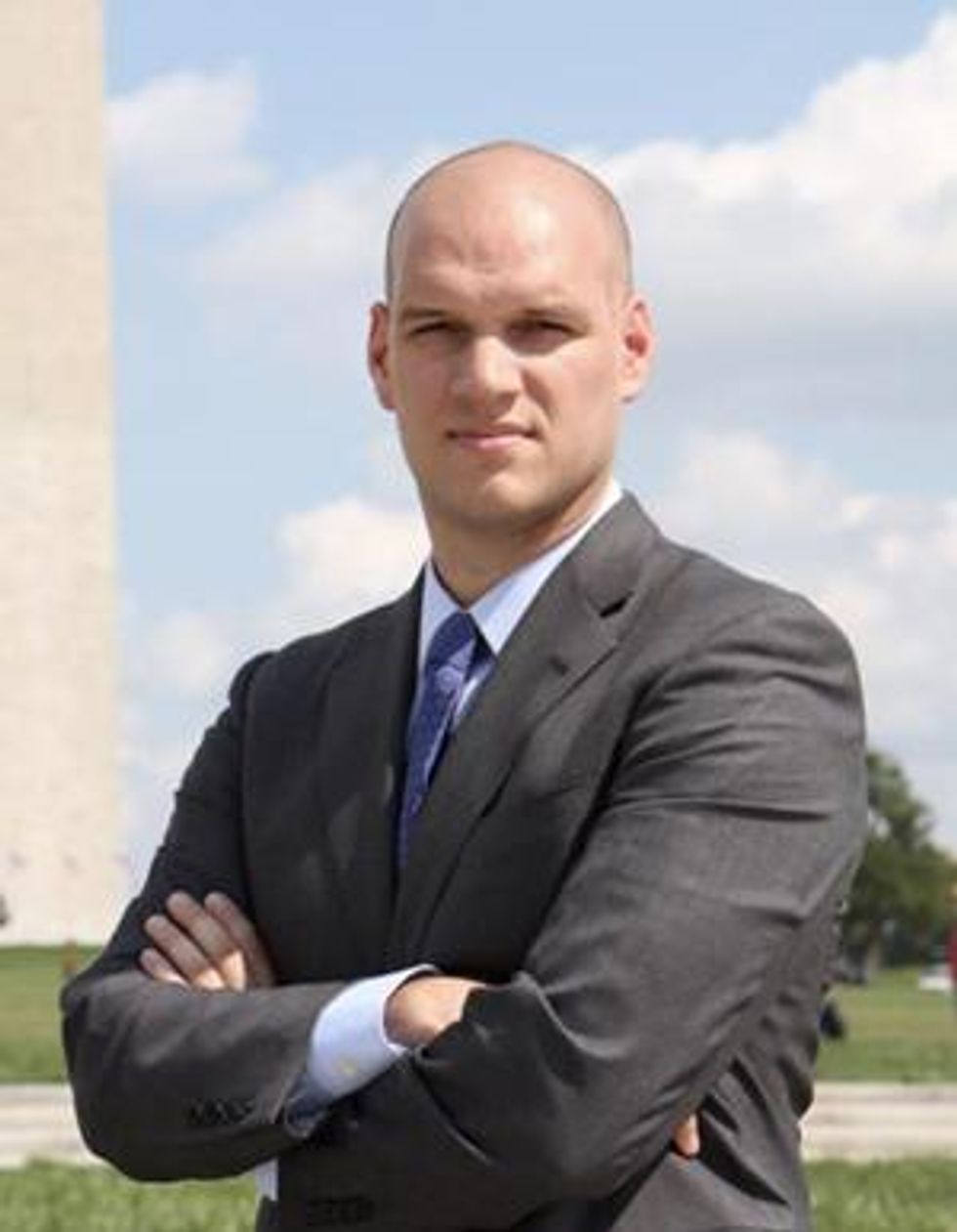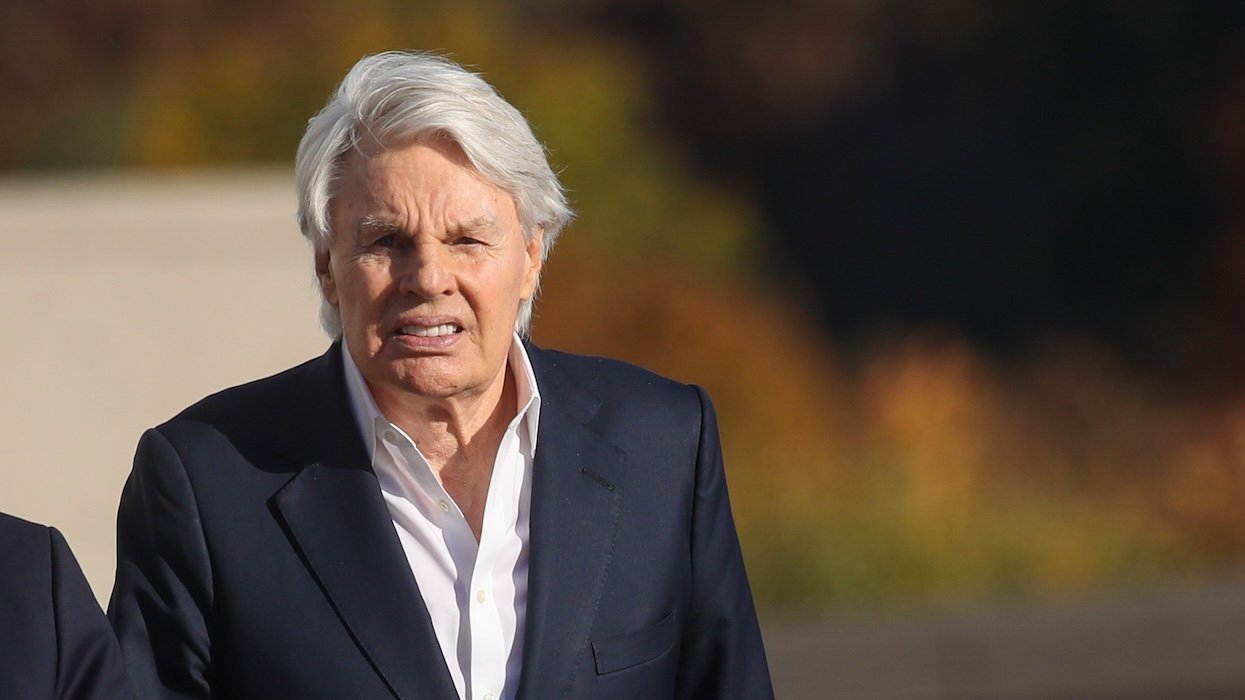When the first out transgender executive director of a national LGBT organization was asked to resign after less than a year in her post, some activists were quick to suspect anti-trans bias at work. Other observers immediately ruled bias out, citing a financial crisis within the organization.
Weeks later, there is no evidence of explicit transphobia surrounding Allyson Robinson's June ouster at LGBT military advocacy group OutServe-Servicemembers Legal Defense Network. What happened is a bit more nuanced, based on interviews and documents made available to The Advocate.
Members and observers acknowledged that OutServe-SLDN faced a serious financial crisis, as external donations dropped precipitously after the 2011 repeal of "don't ask, don't tell." Several members clarified that allegations the organization was bankrupt are untrue, but sources inside the group confirm that OutServe-SLDN had struggled to meet its payroll in the weeks leading up to the June 22 meeting and had begun quietly laying off nonessential staff and working to minimize its overhead. The organization's 11 full- and part-time employees on payroll had been reduced to six full-time employees and one part-time worker by June 2012.
OutServe-SLDN's financial woes were likely compounded by a culture clash between OutServe and SLDN, which formally merged in early 2012. OutServe was a digital group of activists working together to raise the voices of gay and lesbian soldiers serving in silence under DADT, while SLDN looked more like a traditional, brick-and-mortar advocacy organization. Without the common, unifying enemy of DADT, the mission of both OutServe and SLDN became less clear. While Robinson was elected to the group's top spot by a nearly unanimous vote last October, personality conflicts ever since between the new executive director and high-ranking board members were quite familiar to those inside the organization.
On June 22, a regularly scheduled board meeting for OutServe-SLDN took an unexpected and public turn when an email from board member Sue Fulton that proposed asking for Robinson's resignation was inadvertently sent to the broader membership, and subsequently leaked to various media outlets, including Buzzfeed, The Bilerico Project, and AmericaBlog. In the following weeks, OutServe-SLDN scrambled to do damage control on subsequent reports that speculated about Robinson's ouster being a result of systematic transphobia. Buzzfeed reported that anonymous OutServe-SLDN members hypothesized that anti-trans bias might be behind Robinson's ouster, whereas Bilerico published an article on July 10 asking if the OutServe-SLDN scenario was "LGB Transphobia Rearing Its Ugly Head?" Other reports from Bilerico and Buzzfeed accused former co-chair Josh Seefried of leading a coup against Robinson, whose star was rising, arguably overshadowing Seefried.
But those reports are "completely false," says current board chairwoman April Heinze. "The decline in funding had been a growing concern of the board for months and several special board meetings had been held to address reducing expenses and increasing revenue," Heinze explains. "In the end, the board had to make a very tough decision to layoff staff and eliminate our physical offices in order to pay our bills."
Little about what happened in public was so simply explained, though. In the wake of the controversy, three of the 21 board members resigned, and two senior staffers tendered their resignations in solidarity with Robinson. Robinson declined to comment in the days following the public breakdown. When she did eventually issue a statement, Robinson said she was leaving the organization of her own accord. Her last day as OutServe-SLDN's executive director was July 12.
OutServe-SLDN's Zeke Stokes, the organization's director of communications, who was also in charge of securing new funding as OutServe-SLDN's director of external engagement, also quit immediately following the board meeting in June. In a letter of resignation critical of the board, Stokes said the board "made decisions that have compromised the trust I had placed in it," and that the organization's new plans meant "they have for the foreseeable future sacrificed the viability of the mission." Stokes declined to comment further for this article.
 Calls for Seefried (pictured) to resign grew in volume from chapter leaders who believed he was the architect of Robinson's ouster, and sources close to the organization cited ongoing personality conflicts between the two high-ranking officials. Seefried cofounded OutServe with Ty Walrod, who wrote together anonymously under the psuedonym JD Smith, about being gay in the military back when DADT was still on the books. Despite initial resistance, Seefried ultimately tendered his resignation on July 3.
Calls for Seefried (pictured) to resign grew in volume from chapter leaders who believed he was the architect of Robinson's ouster, and sources close to the organization cited ongoing personality conflicts between the two high-ranking officials. Seefried cofounded OutServe with Ty Walrod, who wrote together anonymously under the psuedonym JD Smith, about being gay in the military back when DADT was still on the books. Despite initial resistance, Seefried ultimately tendered his resignation on July 3.
"I will be resigning in the near term from OutServe-SLDN and supporting the recommendations that [transitional] committee comes to," said Seefried. "Regardless of title, I will do everything I can to support a smooth and orderly transition."
Several narratives emerged as the board itself refused to comment on the debacle until a full week after the initial leaked email. Reports of a replacement board proved to be unsubstantiated, as mixed messages trickled out from various facets of the organization.
Sue Fulton, who sent the email that sparked the controversy, maintains that she proposed the motion for Robinson's eventual resignation as an alternative to a harsher motion demanding that Robinson step down immediately. Fulton also maintains that sending the email to the larger listserv was an honest mistake--an assertion that Robinson believes. Documents reviewed by The Advocate indicate that Fulton's motion was offered in response to an earlier proposal that called for Robinson's ouster. Fulton tendered her own resignation immediately after the board meeting, in protest of what she felt was Robinson's mistreatment.
Some still involved with the organization describe Robinson's removal as the result of a loss of confidence the board felt surrounding her ability to successfully manage the organization's finances. "The recent events and actions taken by the Board of Directors were based solely on business decisions regarding finances and fiduciary responsibilities to pay our bills," says current board chairwoman Heinze.
Indications that the organization's financial situation was dire existed before the June board meeting, though. The chief financial officer, Francisco Ramirez, resigned on May 21, claiming he had not "been involved in nor have I agreed with many of the decisions that have been taken lately, and this is a situation that has become untenable for me."
The precise reason behind the initial call for Robinson's dismissal has remained unclear, as both former and current board members are hesitant to go on the record about what really took place inside that June 22 meeting. Some who attended that meeting allege that Robinson had neglected to provide crucial financial information to the board regarding its primary funding source, a line of credit, which was set to expire in the immediate future. Robinson denies that accusation, maintaining that the plan she devised with staff members to turn around the organization's finances would have worked.
Documents made available to The Advocate suggest that a whistleblower notified Robinson of the financial emergency at the end of May, although Robinson allegedly did not report the financial situation to board members until more than two weeks later.
Robinson confirms that she had been tasked with trimming the organization's budget in response to the unanticipated financial shortfall. Robinson had voluntarily taken a personal pay cut and began downsizing the organization to meet the smaller forecasted budget. Along with staff members, Robinson had prepared a new prospective plan that she believed would allow the organization to continue functioning, if on a smaller scale, with fewer boots on the ground, than was previously the case.
"I felt the plan presented by the executive director and staff was reasonable, and doable," Fulton told The Advocate. "We certainly were not having our best times, but I believed that we were going to make it through, and that we had the right plans in place to secure the funding."
Regardless of where the ultimate breakdown occurred, both former and current OutServe-SLDN members agree that the mission the organization serves is an important one. Even in a post-DADT world, there are still important battles to fight to bring full equality to LGBT members of the military.
"This fight and this organization's work is not over," says Seefried. "This comes down to the men and women in uniform who continue to serve in silence. There are thousands of service members and Department of Defense civilians that still feel alone and more importantly, our trans brothers and sisters still cannot serve openly."
Similarly, Robinson promises to continue fighting for LGBT equality, while also taking stock of the accomplishments she achieved in her short tenure with OutServe-SLDN. "I'm proud of our efforts to put military families at the center of the discussion of the Defense of Marriage Act, and to raise awareness of the military's transgender ban," she says. "Most of all, I'm proud of the leadership and selfless service our LGBT service members have demonstrated through it all."
Heinze believes the organization will continue its work to support out service members, though the format in which it does so is likely to change. "I am confident that the organization will emerge from this 'crisis' stronger and better than before, with a renewed since of purpose and engagement--because the job is not done."
Still, several members of OutServe-SLDN's transgender caucus and select local chapters announced their departure from the embattled organization and the creation of a new military equality organization on July 15. "Service Members, Partners, Allies for Respect and Tolerance for All, " or SPART*A, bills itself as a "group of LGBT people and allies who are currently serving or have served in the military, and our families," that is "especially committed to our Trans members... and to gaining full equality for them in the U.S. Armed Forces."
SPLRT*A lists among its strategic priorities supporting LGBT service members with opportunities for professional development and networking, ensuring them equal opportunity protections, creating a fully inclusive culture within the Department of Defense that is respectful of all military members regardless of sexual orientation or gender identity, and providing connections to legal support for any service member who feels they've been a victim of anti-LGBT bias.
"Since the upheaval at OutServe-SLDN began on June 22, the transgender chapter of the organization has been working to determine where and how we can best fit within the movement," wrote Brynn Tannehill, the former chapter spokeswoman for OutServe-SLDN's Military Transgender Group and founding member of SPART*A in a statement. "This process has been painful, and strained personal and professional relationships that had previously been strong... The ultimate question we had to answer was where we need to be in order to most effectively move the issue of open service for transgender people forward. Unfortunately, it was the considered opinion of our members that OutServe-SLDN will not be able to represent our interests effectively for the foreseeable future."
When asked about SPART*A's formation and the defection of certain local OutServe-SLDN chapters, Heinze was diplomatic. "I wish SPART*A all the best," she says. "We may disagree about the means and methods to achieve full equality for LGBT service members and their families in the military, but can all agree it is about the troops."


 Calls for Seefried (pictured) to resign grew in volume from chapter leaders who believed he was the architect of Robinson's ouster, and sources close to the organization cited ongoing personality conflicts between the two high-ranking officials. Seefried cofounded OutServe with Ty Walrod, who wrote together anonymously under the psuedonym JD Smith, about being gay in the military back when DADT was still on the books. Despite initial resistance, Seefried ultimately tendered his resignation on July 3.
Calls for Seefried (pictured) to resign grew in volume from chapter leaders who believed he was the architect of Robinson's ouster, and sources close to the organization cited ongoing personality conflicts between the two high-ranking officials. Seefried cofounded OutServe with Ty Walrod, who wrote together anonymously under the psuedonym JD Smith, about being gay in the military back when DADT was still on the books. Despite initial resistance, Seefried ultimately tendered his resignation on July 3.
















































































